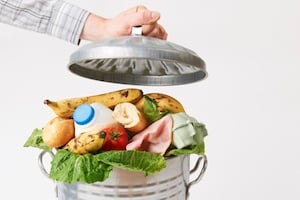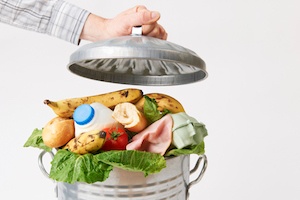Explore Springs Apartments


This article originally appeared on the Springs "You're Home Blog."
America is known as the land of plenty, but it may not stay that way much longer. Studies show that 30 – 40% of the food produced in our country is thrown away. This equates to more than 38 million tons per year, enough to fill 365 football stadiums.
How can you do your part to reduce this number? Here are some valuable tips to help you practice responsible food habits in your Springs luxury apartment home.
1. Plan Your Meals
Do you buy items thinking you'll use them "some time," but that day never comes? Plan each week's meals based on what you have on hand and make a shopping list for fill-in items.
If you need help, the internet is full of resources for general meal planning as well as specific daily menu plans.
2. Learn to Love Leftovers
Eating leftovers doesn't have to be boring. It's easier than you think to transform yesterday's dinner into a delicious new meal. Be sure to label leftovers with the date so you know when they're approaching their last days.
3. Buy in Bulk
Prepackaged items can force you to buy more than you need, leaving a lot of waste behind. Many supermarkets have bulk food aisles where you can buy staples such as rice, pasta, flour, beans and spices in whatever quantity you choose.
Another shopping tip: if you require only small amounts of produce for a recipe, pick them up from the salad bar.
4. Organize the Refrigerator
5. Store Food Properly
Can that leftover chicken go in the freezer? What's the shelf life for olive oil? Use appropriate storage times and methods to get the maximum use out of food products.
6. Expiration Dates Aren't Always Final
Surprise! Expiration dates usually refer to quality of food, not safety. Learn the lingo of product labeling so you don't end up discarding perfectly good food.
7. Practice Portion Control
Sometimes your eyes are bigger than your stomach and you end up with a plateful of half-eaten food. No matter how hungry you are, it's more efficient to start with a smaller portion and go back for seconds than to fill your plate immediately.
8. Leave No Food Behind
Don't throw away those odds and ends! Smoothies, soups and stews are delicious ways to use up the last scraps of items like milk, produce and meat.
9. Share with Others
If you find yourself with excess amounts of canned goods or other non-perishables that you know you won't use, donate them to a local food bank or soup kitchen.
What's your favorite way to dress up leftovers? Tell us about it in the comments!
These Stories on Apartment Living
Take Comfort In Being Home
262-502-5500
We Your Pets
Privacy Policy | Cookie Policy | Terms of Use | Accessibility Statement
Owned and managed by Continental Properties, an award-winning corporate leader and developer of apartment communities nationwide. Copyright © 2026 Springs Apartments